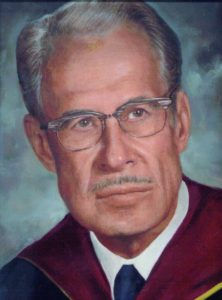 While thinking about today’s entry, I had a flashback of a conversation 40 years ago with Dr. Culbert Rutenber. What a name. “Cubbie” as he was called was a past president of the American Baptist Association and retired faculty member of Andover Newton Seminary. In his retirement he had moved to Austin, Texas. He joined the church I attended and I got to know him a bit. He was tall, thin, distinguished looking, and soft-spoken. Just the way I thought a wise retired professor might be.
While thinking about today’s entry, I had a flashback of a conversation 40 years ago with Dr. Culbert Rutenber. What a name. “Cubbie” as he was called was a past president of the American Baptist Association and retired faculty member of Andover Newton Seminary. In his retirement he had moved to Austin, Texas. He joined the church I attended and I got to know him a bit. He was tall, thin, distinguished looking, and soft-spoken. Just the way I thought a wise retired professor might be.
He told me about a class he taught at seminary years before, a class he designed and proposed to the seminary faculty committee. The class was to help prospective ministers learn how to have a devotional life. He talked about how he had worked with many gifted students, people who would go on to have successful careers in church ministry. Most of them had the scholarly skills, the organizational skills, the Biblical knowledge, the people skills, and all the rest. But few of them, he observed, had any real inner life. They did not know how to be still, to stop the mental chatter that goes with daily life, to listen, to breathe, and to wait for inner wisdom to replace the momentary demand. The committee approved his proposed course, and he taught it for many years.
As a former seminary student, I completely understood his observation. As a student, later as a minister, and still later as a psychologist, a person’s inner life was of utmost importance to me. What’s going on inwardly has everything to do with what happens in our actions, relationships, decisions, and physical symptoms.
Yet, as a seminary student, I had no training on how to develop that inner life. I had classes on how to talk to others about changing their life, but I had no instruction on observing how my own thoughts and feelings might be affecting me and consequently those I worked with. My graduate training in psychology and the supervision I received were the first experiences I had in which another person challenged me to pay attention to how my inner life affected how I lived and how I treated others.
I had Iearned to study the Bible with scholarly rigor, mostly to support what I already believed. But I didn’t really learn how to let the Bible instruct me, challenge me, and change me. I learned all about prayer for seeking answers, but I did not learn much about being humble and open to something completely new.
More about this later, but today, I am grateful for Dr. Culbert Rutenber who, in all his wisdom, calmly reminded me of how important it is to be still, open, humble, and patient.
0 Comments until now
Add your Comment!